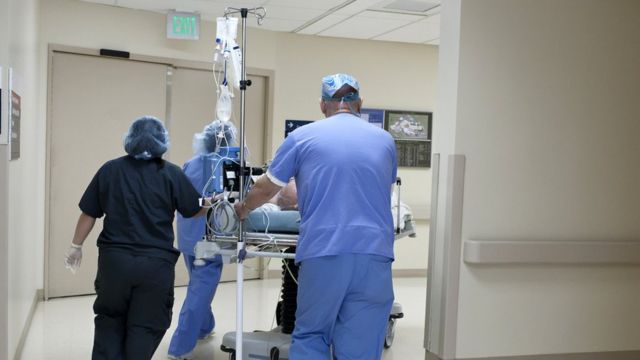Covid-19 increases risk of depression and dementia, British study indicates
British researchers looked at the likelihood of 600,000 patients developing one of 14 common brain diseases
People diagnosed with covid-19 in the past six months were more likely to develop depression, dementia, psychosis and stroke, a new study found.
One third of people infected with the disease developed or had a relapse of a psychological or neurological condition.
But those who were admitted to hospitals or intensive care were at even greater risk.
This is likely due to the effects of stress and the direct impact of the virus on the brain.
Anxiety and mood disorders were the most common diagnoses among people with covid, and these were more likely to occur due to the stress of the experience of being very ill or being taken to the hospital, the researchers explained.
Conditions such as stroke and dementia are more likely to be attributed to the biological impacts of the virus itself or the body's reaction to infection in general.
Covid-19 was not associated with an increased risk of developing Parkinson's disease or Guillain-Barré syndrome (inflammatory process of nerves whose symptoms may be progressive muscle weakness).
Cause and effect
The study was observational, so the researchers could not say whether covid caused any of the above diagnoses - that is, some people could have had a stroke or depression within six months of infection, regardless.
But, comparing a group of people who had covid-19 with two groups - with influenza and other respiratory infections, respectively - researchers at Oxford University (UK) concluded that covid-19 was associated with more subsequent brain diseases than other respiratory diseases.
Participants were divided by age, sex, ethnicity and health conditions, to make them as comparable as possible.
Patients were 16% more likely to develop a psychological or neurological disorder after covid than after other respiratory infections, and 44% more likely than people recovering from the flu.
In addition, the researchers found that the severity of the disease was linked to an increased likelihood of subsequent diagnosis of mental health or brain disorder.
Mood, anxiety or psychotic disorders affected 24% of all patients, but increased to 25% in those admitted to the hospital, 28% in people who were in intensive care and 36% in people who experienced mental confusion during the illness.
Strokes affected 2% of all patients with covid, increasing to 7% of those admitted to the ICU and 9% of those who had mental confusion.
And dementia was diagnosed in 0.7% of all patients with covid, but in 5% of those who experienced delirium as a symptom.
Sara Imarisio, head of research at Alzheimer's Research UK, an NGO focused on dementia research, said: "Previous studies have highlighted that people with dementia are at greater risk of developing severe covid-19. This new study investigates whether this relationship can also be maintained in the other direction. "
"The study does not focus on the cause of this relationship, and it is important for researchers to find out what is behind these findings."
There is evidence that the virus enters the brain and causes direct damage, explains professor of neurology Masud Husain, from the University of Oxford.
Covid-19 can have other indirect effects, for example, affecting blood clotting, which can lead to strokes. And the general inflammation that occurs in the body when it responds to infection can affect the brain.
For just over a third of people who develop one or more of these conditions, this was the first diagnosis.
But even when it came to a recurrence of a pre-existing problem, the researchers said it did not rule out the possibility that covid caused the episode of the disease.
Professor Dame Til Wykes of the King's College London Institute of Psychiatry, Psychology and Neuroscience says: "The study confirms our suspicions that a diagnosis of covid-19 is not only related to respiratory symptoms, but also to psychiatric and neurological problems. Examining (patients) six months after diagnosis has shown that the sequelae may appear much later than expected - something that is not surprising for those who suffer from long covid. "
"Although, as expected, the results are more serious in those admitted to a hospital, the study points out that the serious effects are also evident in those who have not been hospitalized."


No comments:
Post a Comment